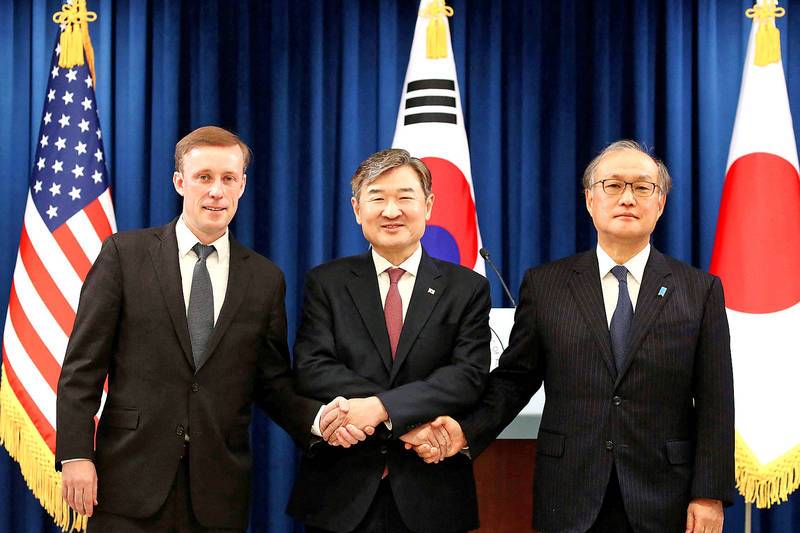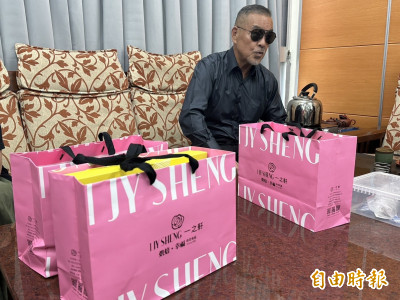《TAIPEI TIMES》 Allies back stability in the Strait: US

South Korean National Security Office Director Cho Tae-yong, center, shakes hands with US National Security Adviser Jake Sullivan, left, and Japanese National Security Secretariat Director-General Takeo Akiba after their joint press conference at the South Korean Presidential Office in Seoul yesterday. Photo: Reuters
COMMITMENTS: The US, Japan and South Korea launched new initiatives to ‘counter the threats’ by Pyongyang, an official said as he also referred to peace in the Taiwan Strait
/ AFP, SEOUL
US National Security Adviser Jake Sullivan yesterday said that Washington and its Asia allies would “stand up” for stability across the Taiwan Strait and reiterated their commitment to freedom of navigation in the disputed South China Sea.
His comments came during a joint briefing with his Tokyo and Seoul counterparts, after a trilateral meeting in South Korea.
Late last month the top diplomats of South Korea, Japan and China — North Korea’s key ally and Washington’s rival — reaffirmed the need to hold a trilateral summit at the “earliest” possible time.
The US and its Western allies have increased “freedom of navigation” crossings by naval vessels in both the Taiwan Strait and the South China Sea, to reinforce that both are international waterways, angering Beijing.
“We will continue to stand up for peace and stability across the Taiwan Strait and freedom of navigation in the East and South China seas,” Sullivan told reporters in Seoul, alongside South Korean National Security Office Director Cho Tae-yong and Japanese National Security Secretariat Director-General Takeo Akiba.
South Korean President Yoon Suk-yeol has moved to strengthen ties between Seoul and long-standing ally Washington to counter rising threats from nuclear-armed North Korea.
He has also sought to resolve differences with Japan, another close US ally and Seoul’s former colonial ruler.
In August, the three allies said a “new chapter” of close three-way security cooperation was beginning after a historic summit at Camp David in the US.
Beijing had lodged complaints over a statement released at the summit at the time, in which the three nations criticized China’s “aggressive behavior” in the South China Sea.
In April, Yoon said tensions over Taiwan were due to “attempts to change the status quo by force.”
The comment resulted in a diplomatic tit-for-tat with China, South Korea’s biggest trading partner.
Last month, Seoul, Tokyo and Beijing made efforts to organize a trilateral leaders’ summit. The last such meeting was in 2019.
Washington last month said that military ties between North Korea and Russia were “growing and dangerous” and called on China to restrain Pyongyang.
Sullivan also said the three allies have launched “new trilateral initiatives” to “counter the threats” posed by North Korea, including “deepened collaboration” among their coast guards.
Washington is working with Seoul and Tokyo to strengthen defense cooperation, Sullivan said.
He said they also seek to improve response to North Korean missile testing and space launch activities, including a real-time information sharing arrangement on North Korean missile launches that the countries plan to start this month.
Cho said the three security advisers reaffirmed North Korea’s obligations under multiple UN Security Council resolutions that call for its denuclearization and ban any weapons trade with other countries.
“We agreed to strengthen a coordination among the three countries to secure the international community’s strict implementation” of the UN Security Council resolutions, Cho said.
Cho said the three also highly praised South Korea, the US, Japan and Australia announcing their own sanctions on North Korea over its spy satellite launch last month.
North Korea said it has the right to launch spy satellites to monitor US and South Korean military activities and enhance the threat of its nuclear-capable missiles.
The North successfully put a military spy satellite into orbit last month — with Seoul saying Pyongyang did so with Moscow’s help.
North Korea soon after said its eye in the sky was already providing images of major US and South Korean military sites.
Washington, Tokyo and Seoul have led a chorus of global condemnation of the North for violating multiple UN Security Council resolutions, which bar it from tests using ballistic technology, used in both missiles and space launch rockets.
Additional reporting by AP
新聞來源:TAIPEI TIMES

















